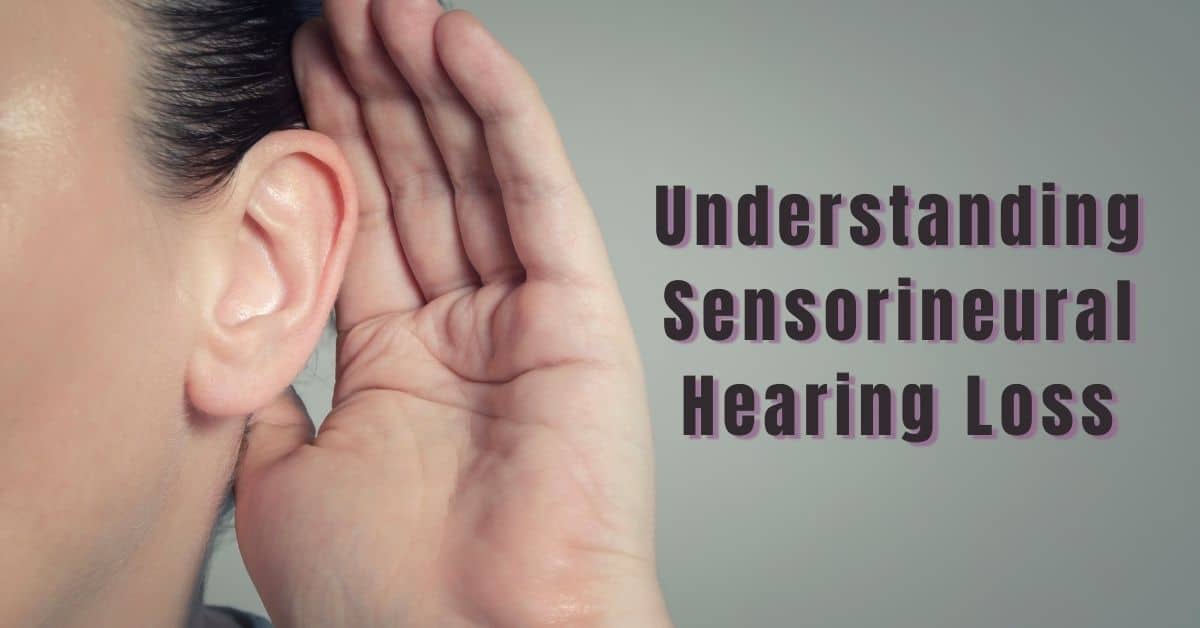Hearing is one thing that we take for granted until one day we realize how much of it we have lost. The sooner we begin to pay attention to our ears, the sooner we can respond when we detect a difference in our hearing ability. Today we’re going to focus on one significant type of hearing loss: sensorineural hearing loss.
Let’s first take a look at each type of hearing loss. There are three main types of hearing loss: conductive, sensorineural, and mixed hearing loss.
- Conductive hearing loss refers to some blockage in the ear which interferes with the passage of the sound. It may occur due to a congenital ear canal deformity, middle ear structure malformation or head trauma, infections, cancers, impacted earwax, or other medical conditions that interfere with the conduction of sound from the outer ear to the inner ear.
- Sensorineural hearing loss refers to issues with the inner ear’s anatomy and the mechanism of converting sound waves into electrical signals sent to the brain. Loud noise exposure, aging, and Meniere’s disease all contribute to sensorineural hearing loss.
- Mixed hearing loss, as you might imagine, is a mix of conductive and sensorineural hearing loss. The auditory system (outer, middle, and inner ear) is impaired or damaged by combined conditions.
A closer look at sensorineural hearing loss
Sensorineural hearing loss refers to the inner ear, consisting of the auditory nerve, vestibular nerve, the cochlea, and the vestibular system. Sound waves penetrate the ear and are converted into electric signals transmitted to the brain by the inner ear, which records the signal as a sound. Sensorineural hearing loss happens when either the cochlea or nerve tracts between the inner ear and the brain are impaired.
Why is it essential to focus on this type of loss over the others? According to the American Hearing Loss Foundation, sensorineural hearing loss is “the most common type of hearing loss, occurring in 23 percent of the population older than 65 years of age.”
What causes sensorineural hearing loss?
Often permanent, this kind of hearing loss has multiple causes.
Excessive noise. Exposure to loud noises, 90 decibels, and higher, for a prolonged period, will result in sensorineural hearing loss. Also a single loud exposure such as a gunshot or other unexpected loud sound can cause sensorineural hearing loss. This is called noise-induced hearing loss and it is preventable if you take the necessary precautions when exposed to noise.
Aging. As you age, you’ll undergo a variety of changes in how your body works. One such condition may be hearing loss. Hearing loss, as a result of aging, is a common disorder affecting many older adults. Nearly 1 in 2 people over the age of 65 suffer some degree of hearing loss. Age-related hearing loss is also known as presbycusis. While presbycusis is not a life-threatening condition, it can have a significant effect on your quality of life if left untreated.
Inherited conditions. In some instances, an inherited internal ear malformation results in loss of hearing. Some infections transmitted from mother to children, such as rubella or human cytomegalovirus (HCMV), can also contribute to sensorineural hearing loss. Mumps, syphilis, bacterial meningitis, and autoimmune disorders may lead to sensorineural hearing loss as acquired disorders.
Certain types of drugs. Unfortunately, by irreparably destroying the inner ear’s hair cells that do not regenerate, a small number of medications used to treat diseases could also cause sensorineural hearing loss. This condition is known as “ototoxicity” or ear poisoning.
Physical trauma. A temporal bone injury may affect the cochlea, while the auditory system may be affected by other head and neck injuries. Tumors can also cause sensorineural hearing loss in the head and neck area by causing pressure inside the inner ear.
Can I cure my sensorineural hearing loss?
Unfortunately, sensorineural hearing loss is usually a permanent condition. However, there are beneficial treatments that can help. Using a hearing aid has significantly improved the lives of millions of people living with sensorineural hearing loss around the world.
However, hearing is also an intensely individual experience, and, for this reason, there is not a “one-size-fits-all” hearing loss remedy conveniently found over the counter. If you have undergone hearing changes, it is essential to seek professional treatment.
It all starts with a hearing test with us at The Hearing Health Center of Houston. We will be able to identify your particular hearing needs and work with you to find the best treatment to help you stay connected. Contact us today to schedule a consultation!


